At the end of November 2022, a topic exploded on social media: OpenAI, based in California's Silicon Valley, released the beta version of ChatGPT, a chat-based AI app that generates content.
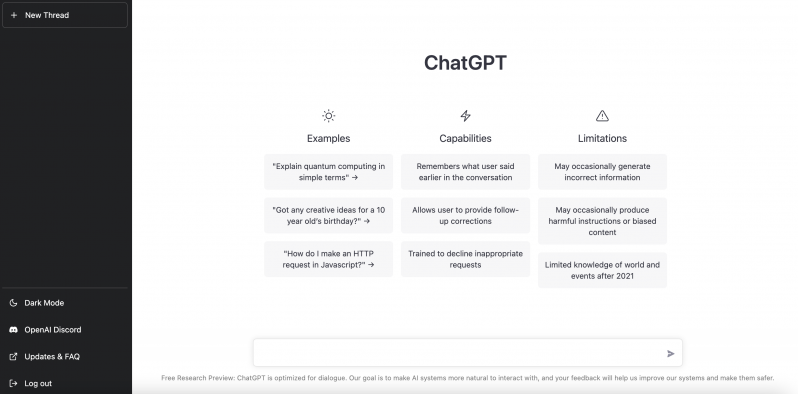
People testing conversations with ChatGPT quickly noticed that even in beta state, i.e. without final development and bug fixes, the tool was already very advanced and surprisingly accurate even in the more difficult language areas – such as Finnish.
In less than a week, ChatGPT had attracted more than a million users to chat with the AI bot. By comparison, Twitter broke the one million user barrier in two years, Spotify in five months. For ChatGPT, it took five days.
What does ChatGPT do?
ChatGPT is designed to respond to chat prompts with human-like responses that are actually generated by algorithms. For example, a ChatGPT user can ask the AI to write an essay, poem, song, or script on a specific topic, or even translate or summarize a text.
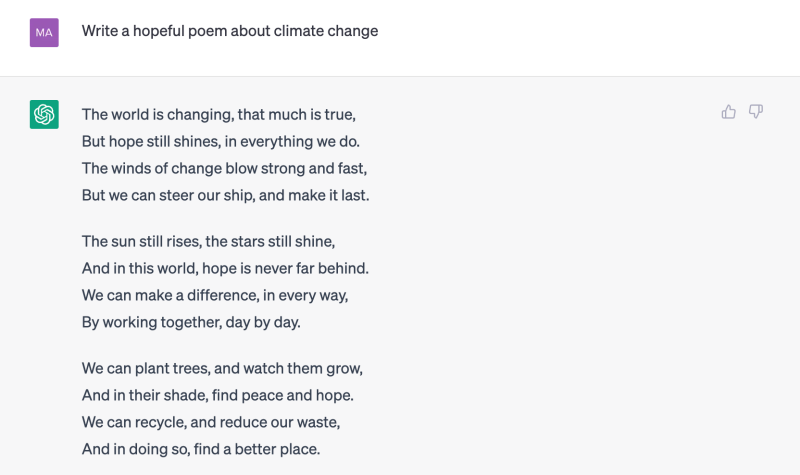
It can also answer questions on a wide range of topics or solve coding problems (however, this feature is not quite at the level of text generation yet, according to users.)
However, ChatGPT is not a search engine: it does not list all the information available on a particular topic in various search results but rather answers a question or request on the topic in a conversational manner. It can therefore include a lot of information around a particular topic in the text it provides, such as the history of a particular place or the possibilities for spending time in a particular destination.
This is how OpenAI explains its underlying purpose on its website: "OpenAI is a company focused on the research and use of artificial intelligence. Our mission is to ensure that AI benefits all of humanity." The company is also behind DALL-E 2, the software that generates images using AI. The company was founded by Elon Musk, a controversial businessman who left OpenAI over disagreements about its development.
OpenAI's proclamation of benefiting all of humanity was strongly linked to its early non-profit ideology, but the tone has since changed. DALL-E 2 charges $0.02 per 1024×1024 image if more than 15 AI-generated images are downloaded per month. The main image in this article was created as a "collaboration" between ChatGPT and DALL-E 2: the image prompt was written by ChatGPT for "an article on AI and chatbots" and fed into DALL-E 2.
The chatbot is free to use at this stage, but this is very likely to change as we move from beta. The costs of running the code are gigantic, according to Sam Altman, CEO of OpenAI. Some relief to this issue is brought by the billion dollars Microsoft has invested in OpenAI and the development work on Microsoft's Azure platform and AI.
Microsoft already tried its luck independently with AI bots in the past. The company offered users a bot called Tay in 2016, but trolls on Twitter, who were amusing themselves by causing chaos, taught the bot to use hate speech in their replies in less than 24 hours and the bot was axed. Meta launched BlenderBot3 in August 2022, but it met Tay's fate very soon after when the same army of trolls taught it to spew misinformation and hate speech.
How can OpenAI avoid the fate of previous bots? ChatGPT has used the Moderation API – an AI-based monitoring system trained to help developers determine whether the language used violates OpenAI's content policy. This, at least in theory and for the most part, prevents the dissemination of dangerous or illegal information through ChatGPT. However, to cover its back, OpenAI acknowledges that moderation may fail in some situations and is not 100% accurate.
What does the popularity of AI-generated content mean for professional writers?
Naturally, many content providers are wondering what the tremendous improvement in the quality of AI-generated content compared to previous providers means for the continuation of their own work. Some of the articles on new AI applications are provocative, if not apocalyptic, for the work of the human mind.
Some of the stories paint either a negative or positive picture of how AI-generated material has the potential to do the job of architect, musician, and CEO. Such ideas can be challenged as utopian from the get-go.
ChatGPT may be advanced, but its developer is the first to tell us that the material it produces will never be flawless. Text can be understandable, grammatically correct, and somewhat sensible and still be nonsensical in context. There is a great risk if you blindly start believing that AI will produce a perfectly error-free and coherent text.
Many AI engines that produce long texts will, after a certain period of time, start recycling the same content in a different order, making the text, while grammatically correct and sensible, repetitive and monotonous. In some cases, this content recycling also makes the text degenerate and factual errors start to proliferate. The context is therefore correct, but the repetitive content dulls the text.
It is also worth bearing in mind that, at least for the beta version, the time span of the dataset extends to the end of 2021. So when you ask the bot about events in 2022, the answer is something like "I have not heard of such an event, so unfortunately I cannot answer".
Perhaps the underlying idea is that if the database is the Internet, can you blindly trust the content on the Internet? The answer is a resounding 'no'.
How can a content producer really benefit from AI?
Just a ten-minute test with the ChatGPT beta shows that we have something great on our hands – if not revolutionary in terms of content production, then at least informative and entertaining.
The biggest benefit is the ease of content production. You can instruct ChatGPT to make you a list of, say, the benefits of marketing automation and use it as the basis for a blog post.
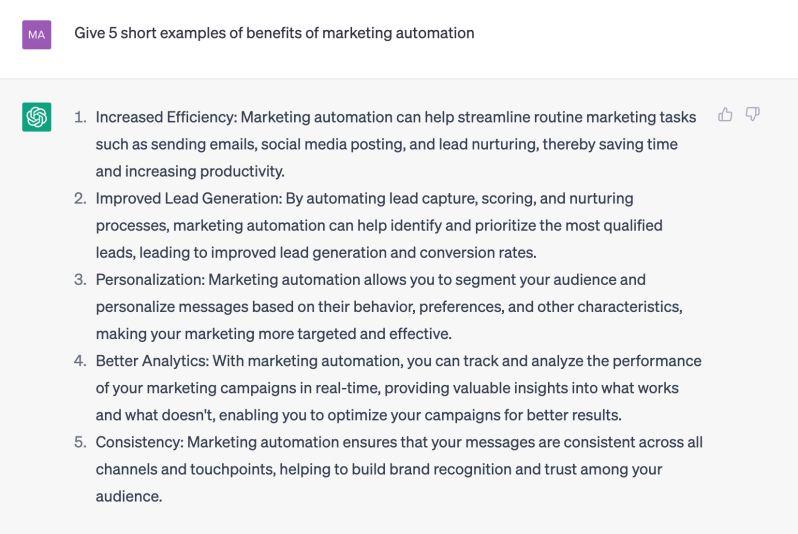
Assisting and supporting simple writing tasks could also be a future benefit of AI in content production. Simple writing tasks could include ideating the content of a blog post around a specific topic, paragraphs for a press release, and words and phrases for search engine optimization.
Uses for marketers and communicators:
- Developing a marketing plan
- Creating a social media strategy
- Press release writing support
- Content generation for blog post sections
- Hyper-personalization of content
- Finding relevant keywords for search engine optimization
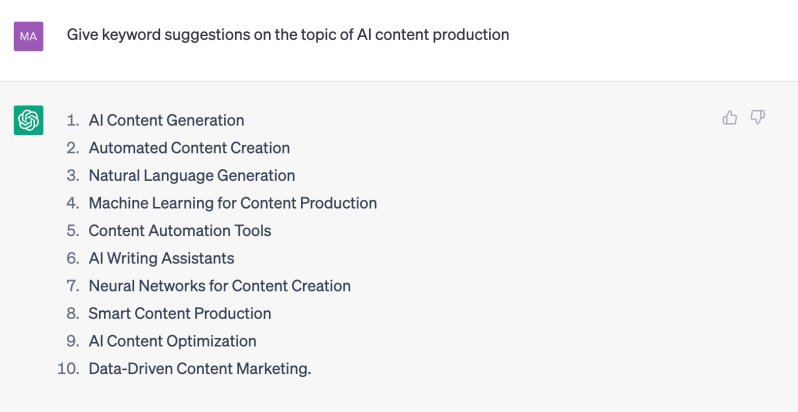
However, in the examples given, it should be remembered that, for example, in collecting data for extreme personalization, the question is not what can be done, but what is allowed to be done. Apple and Google have already taken their own initiatives to remove third-party cookies and there will undoubtedly be more regulations and laws supporting data protection in the future.
Finally, of course, we must ask the ChatGPT bot itself how, in light of all the information it contains, it sees the future of AI and content creation.
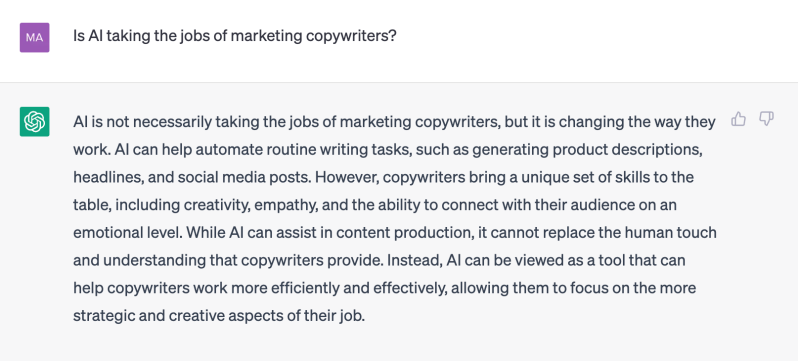
Even AI itself raises a very important point in its response: 'copywriters bring a unique set of skills to the table, including creativity, empathy, and the ability to connect with their audience on an emotional level'.
Creativity and empathy are something that machine-generated text can simulate by churning through enormous masses of data, but human thinking and human experiential creativity will always be necessary to understand and explain the world.
While AI can be a good helper, it is no substitute for human assistance in marketing and communication. We offer a full-service digital marketing partnership and our professionals provide help with tasks such as search engine optimization and marketing automation.
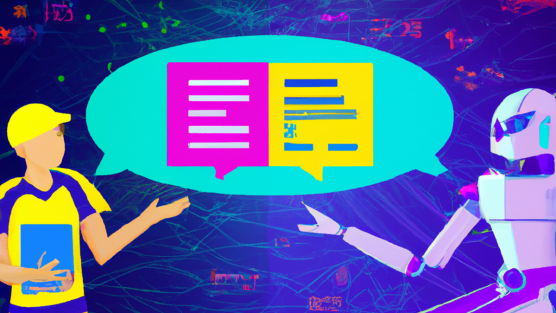

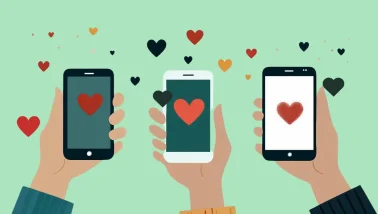
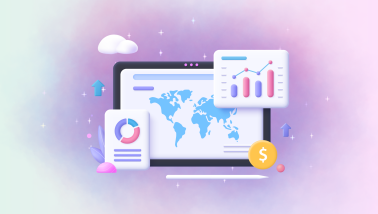
![How to Get Started with Podcasts? [Infographic]](/media/blog/podcast-article/cache/starting-your-own-podcast-article-cover-378x214,c.png)